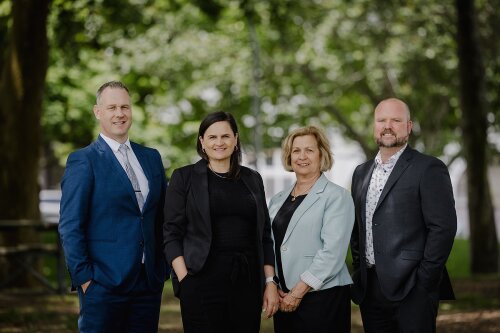Best Government Relations & Lobbying Lawyers in Cambridge
Share your needs with us, get contacted by law firms.
Free. Takes 2 min.
List of the best lawyers in Cambridge, New Zealand
1. About Government Relations & Lobbying Law in Cambridge, New Zealand
Cambridge sits within Waipā District, governed by local authorities that include Waipā District Council and Waikato Regional Council. Residents and businesses frequently engage these bodies on planning, environmental, and development issues. Government relations and lobbying professionals help clients understand local processes, prepare submissions, and navigate hearings in a compliant way.
In New Zealand, government relations and lobbying activities are focused on transparency, accountability, and effective communication with elected representatives. A solicitor or legal counsel working in Cambridge often assists with planning submissions, policy consultations, and regulatory advocacy. They ensure engagement aligns with council codes of conduct and public information rules.
Local engagement is guided by established frameworks, including council meeting procedures and information rights. A Cambridge solicitor can tailor strategies for planning changes, resource management, and procurement matters while avoiding conflicts with public process requirements. This guidance helps avoid delays and clarifies expectations for all parties involved.
Local Government Official Information and Meetings Act 1987 requires local authorities to make information accessible and meetings open to the public.
Source: Ombudsman NZ and local government resources (official government information channels) - see https://www.ombudsman.parliament.nz/what-we-do/local-government-official-information-and-meetings-act-1987
The Local Government Act 2002 structures how councils operate, including decision making and public involvement.
Source: Waipā District Council and Waikato Regional Council pages describing local governance frameworks - see https://www.waipadc.govt.nz/ and https://www.waikatoregion.govt.nz/
The Resource Management Act 1991 governs environmental planning and resource consent processes that affect Cambridge developments.
Source: Waikato Regional Council environmental planning guidance - see https://www.waikatoregion.govt.nz/
2. Why You May Need a Lawyer
Submitting a formal plan change submission to Waipā District Council. A legal counsel helps draft precise grounds, tailor evidence, and align arguments with planning policies to improve acceptance chances. Submissions usually follow a strict timetable, so timely preparation matters.
Preparing and presenting a submission to a resource consent or plan variation. A solicitor can advise on the required evidence, expert reports, and cross-examination readiness for hearings held by the council or independent commissioners. This reduces the risk of rejection or costly delays.
Responding to a council information request under LGOIMA. Lawyers help structure information access requests, assess limits on disclosure, and handle any objections from the council. Proper legal redress can prevent prolonged disputes.
Negotiating consent conditions or remediation requirements with the council. Legal counsel coordinates with planners to ensure conditions are clear, measurable, and enforceable, reducing post-consent disputes. This often shortens the post-approval adjustment period.
Defending against inquiries into governance processes or alleged breaches of council codes of conduct. A solicitor can advise on procedural fairness, conflict of interest disclosures, and proper communications with elected members. This protects both the client and the integrity of the process.
Engaging in procurement or tender processes with local authorities. Lawyers help ensure compliance with council procurement rules, contract terms, and anti-corruption safeguards. Clear terms reduce the chance of bid challenges or delays.
3. Local Laws Overview
The Cambridge area operates under several key statutes that shape government relations and lobbying activity. Below are 2-3 specific laws commonly involved in local governance and planning matters.
- Local Government Act 2002 - Sets out how councils operate, including decision making, elections, and public participation. It provides the framework for council meetings and consultation processes. Effective since 1 July 2003.
- Local Government Official Information and Meetings Act 1987 - Establishes public access to official information and transparency for meetings. It governs how information requests are handled and how meetings are conducted. Enacted in 1987 and amended over time.
- Resource Management Act 1991 - Regulates environmental planning and resource consent processes within the Waikato region, including Cambridge. It guides how councils assess environmental impacts and manage development. Enacted in 1991 and subject to ongoing reforms in planning policy discussions.
For practical application in Cambridge, local government practice combines these statutes with council by-laws, standing orders, and the district planning framework. Official council guidance and planning documents provide context for how these acts are implemented in Waipā and Waikato.
Local governance in Cambridge relies on transparent information practices and structured consultation under LGOIMA and LGA frameworks.
Source: Waikato Regional Council and Waipā District Council - see https://www.waikatoregion.govt.nz/ and https://www.waipadc.govt.nz/
4. Frequently Asked Questions
What is Local Government Act 2002 and why does it matter?
The Local Government Act 2002 governs how councils operate and make decisions, including public participation rules. Understanding it helps you engage effectively with Waipā District Council.
How do I start a submission to Waipā District Council?
Begin with a planning or resource management issue, gather evidence, and prepare a concise written submission. A lawyer can help ensure compliance with submission deadlines and content requirements.
How much does legal advice for lobbying typically cost in Cambridge?
Costs vary by matter complexity and duration. A preliminary consultation may range from a few hundred to several thousand dollars, with ongoing work billed hourly or on retainer.
How long does a planning submission or hearing process take?
Submission review periods often occur within a few weeks, with hearings sometimes extending to several months depending on complexity and appeal rights. Your lawyer can provide a timeline based on your case.
Do I need to be a Cambridge resident to engage a local government lawyer?
No. You can engage a Cambridge-focused lawyer or a national firm with local government experience. The key is their familiarity with Waipā and Waikato processes.
Is there a lobbying register in New Zealand?
New Zealand does not have a single nationwide lobbying register. Some councils require registration of consultants for specific processes, and firms often track engagement activity for compliance.
Can I meet with councillors about a planning matter?
Yes, but meetings typically follow council protocols and may require public notification or official channels. A lawyer can help prepare talking points and ensure compliance with conduct rules.
What is LGOIMA and how can I request information?
LGOIMA provides rights to access official information from local authorities and to attend meetings. Your lawyer can guide you through a formal information request process.
What is the difference between a solicitor and a lobbyist in Cambridge?
A solicitor provides legal advice and representation, while a lobbyist focuses on influencing decisions or policy. In Cambridge, many professionals blend both roles within compliance boundaries.
Should I hire a local Cambridge lawyer or a national firm?
Local knowledge of Waipā and Waikato planning processes is beneficial. A Cambridge-focused lawyer can offer targeted familiarity with local councils and hearings.
How do I evaluate a lawyer's experience with local government?
Ask about the number and type of planning submissions, hearings, and procurement matters they have handled. Request client references and sample submissions if allowed.
What documents should I prepare before a council hearing?
Prepare a planning or planning policy document, any expert reports, maps or diagrams, and a timetable of key dates. A lawyer helps assemble and organize these materials.
5. Additional Resources
- Waipā District Council - Official local government authority for Cambridge, providing plan changes, submissions, and public meeting information. Website: https://www.waipadc.govt.nz/
- Waikato Regional Council - Regional planning, environmental regulation, and resource management guidance affecting Cambridge. Website: https://www.waikatoregion.govt.nz/
- Office of the Auditor-General (OAG) - Independent reports on local government governance and performance, useful for benchmarking and compliance. Website: https://oag.govt.nz/
6. Next Steps
Define your objectives and desired outcomes for Cambridge engagement. Include a realistic timeline and budget range to share with counsel.
Gather relevant documents such as planning notices, maps, previous submissions, and correspondence with Waipā District Council. Prepare a concise summary of your issue.
Identify 2-3 local government lawyers or firms with Cambridge and Waikato planning experience. Seek referrals and check recent local government matters they have handled.
Request written proposals outlining scope of work, deliverables, and fee estimates. Compare hourly rates, retainer options, and milestone payments.
Schedule initial consultations to discuss your matter, timeline, and expected outcomes. Aim for 30-60 minutes per consultation, with a clear plan of action.
Check references and confirm suitability for regulatory matters, hearings, and information requests. Verify track record with Waipā District Council processes.
Engage the chosen solicitor or counsel with a written retainer. Confirm responsibilities, fees, communication channels, and expected deliverables.
Lawzana helps you find the best lawyers and law firms in Cambridge through a curated and pre-screened list of qualified legal professionals. Our platform offers rankings and detailed profiles of attorneys and law firms, allowing you to compare based on practice areas, including Government Relations & Lobbying, experience, and client feedback.
Each profile includes a description of the firm's areas of practice, client reviews, team members and partners, year of establishment, spoken languages, office locations, contact information, social media presence, and any published articles or resources. Most firms on our platform speak English and are experienced in both local and international legal matters.
Get a quote from top-rated law firms in Cambridge, New Zealand — quickly, securely, and without unnecessary hassle.
Disclaimer:
The information provided on this page is for general informational purposes only and does not constitute legal advice. While we strive to ensure the accuracy and relevance of the content, legal information may change over time, and interpretations of the law can vary. You should always consult with a qualified legal professional for advice specific to your situation.
We disclaim all liability for actions taken or not taken based on the content of this page. If you believe any information is incorrect or outdated, please contact us, and we will review and update it where appropriate.









